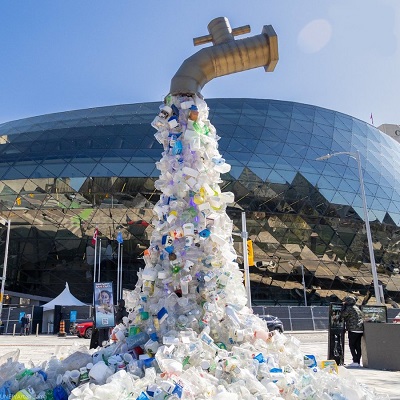New Delhi, (Asian independent) Delegates from across the globe, comprising the Indian delegation, civil society members, indigenous peoples and scientists, tasked with crafting an international legally binding instrument named the Global Plastic Treaty to end the scourge of plastic pollution, have ramped up urgency as little time left to decide on key outcomes of the summit that reached penultimate day on Sunday.
Canada is hosting the negotiations in the capital city with its Minister of Environment and Climate Change Steven Guilbeault in his opening remarks drew attention to the host country alliance to lead conversations on key political issues, and emphasised his country’s pledge of CAD 10 million towards the Global Plastic Action Partnership and CAD 5 million towards the PROBLUE, a multi-donor trust fund monitored by the World Bank that supports sustainable oceans.
Nearly 4,000 representatives from the UN member states and observers will be attending the fourth session, Intergovernmental Negotiating Committee (INC-4), where financing will be one of the key issues discussed.
The Indian delegation at the negotiations is led by Minister of Environment, Forest and Climate Change Additional Secretary Naresh Pal Gangwar.
India advocates for the prospective instrument “to safeguard human health and the environment from plastic pollution, including in marine environments, while ensuring sustainable development”.
Believing in the principles of equity, sustainable development, and common but differentiated responsibilities, India, however, is opposing any limitations on primary plastic polymers or virgin plastics. On chemicals used in plastic manufacturing, India says some are already subject to prohibition or regulation under different conventions.
India took a step to curb pollution caused by littered and unmanaged plastic waste on July 1, 2022, by imposing a ban on the manufacture, import, stocking, distribution, sale and use of identified single-use plastic items, which have low utility and high littering potential.
India is a key partner to help us beat plastic pollution and is investing in alternative solutions to plastic and waste management, says UNEP Executive Director Inger Andersen.
At the venue, delegates are welcomed by the art installation ‘Turn off the Plastic Tap’ by Benjamin Von Wong, reminding them of the urgency of addressing plastic pollution.
According to a World Bank’s blog, recent estimates are that $1.64 trillion will be required by 2040 to beat plastic pollution. These figures reveal that national budgets are falling short, and a systems change will require significant public and private financial resources, including innovative financing, and a large-scale redirection of financial flows.
In January, the World Bank introduced the world’s first Plastic Waste Reduction-Linked Bond providing investors with a financial return linked to plastic credits and carbon credits expected to be generated by two collection and recycling projects in Ghana and Indonesia.
What must the Treaty achieve?
Environmental law charity ClientEarth explains. Cover the full life cycle of plastics, from extraction of raw materials to waste management; deliver a global, legally-binding target to reduce plastics production; require the protection of the health of people and the environment, as well as human rights; halt the construction of new or expanded plastics production facilities; and require financial flows to move away from investment in plastics.
What is the urgency for the Treaty?
Plastic is a synthetic organic polymer made from petroleum with properties ideally suited for a wide variety of applications including packaging, building and construction, household and sports equipment, vehicles, electronics and agriculture.
According to IUCN (International Union for Conservation of Nature), over 400 million tons of plastic are produced every year, half of which is used to create single-use items such as shopping bags, cups and straws. If discarded improperly, plastic waste can harm the environment and biodiversity.
At least 14 million tonnes of plastic end up in the ocean every year. Plastic debris is currently the most abundant type of litter in the ocean, making up 80 per cent of all marine debris found from surface waters to deep-sea sediments. Plastic is found on the shorelines of every continent, with more plastic waste found near popular tourist destinations and densely populated areas.
The main sources of plastic debris found in the ocean are land-based, coming from urban and storm water runoff, sewer overflows, littering, inadequate waste disposal and management, industrial activities, tyre abrasion, construction and illegal dumping. Ocean-based plastic pollution originates primarily from the fishing industry, nautical activities and aquaculture.
What is the expected outcome of the treaty talks months ahead of making history in Korea, which is intended as the end of the Intergovernmental Negotiating Committee (INC) process?
According to the International Institute for Sustainable Development (IISD), whose observers are monitoring the plastic pollution talks both in the corridors and behind closed doors, many participants were involved in fevered conversations about the status of the draft and the nature and magnitude of inter-sessional work ahead.
“They’ve spent so much time streamlining the text that we really may not get to the heart of the textual negotiations at this meeting,” lamented one worried observer. One participant said that “at this stage, we don’t know if we are taking one step forward and two steps back, or two steps forward and one step back.”
On inter-sessional work, as per IISD, one delegate was overheard saying, “this cannot be a repeat of Nairobi… the earlier we hear what is planned, the sooner we can agree.”
One seasoned delegate, commenting on the sheer volume of work remaining, wondered if INC-4, the current negotiations, would benefit from “one additional day of negotiations.”
A plenary scheduled for Sunday (Canadian time) may give additional guidance.
Expressing gratitude to Ambassador of Ecuador to the UK, Luis Vayas Valdivieso, who is Chair of the INC, UN Environment Programme Inger Andersen wrote on X, “Through his leadership, together with the INC Bureau and strong support of the INC Secretariat, I know #INC4 can deliver meaningful progress towards an ambitious #PlasticsTreaty that will end plastic pollution.”
Two years have passed since the United Nations Environment Assembly resolution that green-lit the negotiations to deal with the full cycle of plastics.








